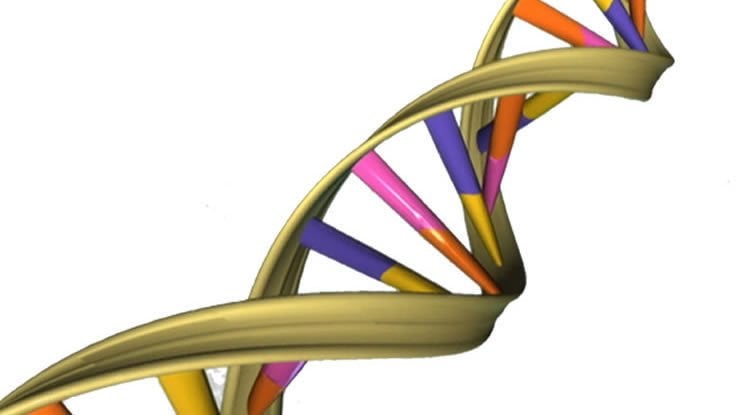Summary: Researchers have identified 124 genetic variants located on 99 separate regions of the genome which are linked to a person’s tolerance and willingness to take risks.
Source: University of Toronto.
An international group of scientists has identified 124 genetic variants associated with a person’s willingness to take risks, as reported in a study published today in Nature Genetics.
The scientists highlight that no variant on its own meaningfully affects a particular person’s risk tolerance or penchant for making risky decisions, and non-genetic factors matter more for risk tolerance than genetic factors. Yet, taken together, the genetic variants identified in the study shed light on some of the biological mechanisms that influence a person’s willingness to take risks.
The study shows evidence of shared genetic influences across both an overall measure of risk tolerance and many specific risky behaviors. It is one of the largest genetics studies to date, and is based on the genetic information from over one million individuals with European ancestries — much larger than any previous study on the genetics of risk tolerance.
“Genetic variants that are associated with overall risk tolerance — a measure based on self-reports about individuals’ tendencies to take risks in general — tend to also be associated with more speeding, drinking, tobacco and cannabis consumption, and with riskier investments and sexual behavior,” said Jonathan Beauchamp, corresponding author and assistant professor of economics at the University of Toronto.
“We also found shared genetic influences on overall risk tolerance and several personality traits and neuropsychiatric traits — including ADHD, bipolar disorder, and schizophrenia.”
The effects of each of the 124 genetic variants on an individual basis are all very small, but their combined impact can be significant.
“The most important variant explains only 0.02 percent of the variation in overall risk tolerance across individuals,” said Beauchamp. “However, the variants’ effects can be combined to account for greater variation in risk tolerance.”
The authors created a ‘polygenic score’ that captures the combined effects of 1 million genetic variants and statistically accounts for approximately 1.6% of the variation in general risk tolerance across individuals.

“I expect it to be useful in social science studies,” said Beauchamp. “For instance, the score can be used to study how genetic factors interact with environmental variables to affect risk tolerance and risky behaviors.”
The authors add, however, that the score cannot meaningfully predict a particular person’s risk tolerance or risk taking behavior.
The 124 genetic variants are located in 99 separate regions of the genome. The study found no evidence to support previously reported associations between risk tolerance and certain genes (such as genes related to the neurochemicals dopamine or serotonin — which are involved in the processing of rewards and mood regulation). Instead, the authors’ results suggest that the neurochemicals glutamate and GABA contribute to variation in risk tolerance across individuals. Both are important regulators of brain activity in humans and animals: glutamate is the most abundant neurotransmitter in the body and boosts communication between neurons, whereas GABA inhibits it.
“Our results point to the role of specific brain regions–notably the prefrontal cortex, basal ganglia, and midbrain–that have previously been identified in neuroscientific studies on decision-making,” Beauchamp said. “They conform with the expectation that variation in risk tolerance is influenced by thousands, if not millions, of genetic variants.”
The data for this study were from the UK Biobank, the personal genomics company 23andMe, and 10 other, smaller genetic datasets.
Funding: The work was supported by The Ragnar Söderberg Foundation, Swedish Research Council, Jan Wallander and Tom Hedelius Foundation, ERC Consolidator Grant, Pershing Square Fund, Foundations of Human Behavior, Open Philanthropy Project.
Source:Sean Bettam – University of Toronto
Publisher: Organized by NeuroscienceNews.com.
Image Source: NeuroscienceNews.com image is in the public domain.
Original Research: Abstract for “Genome-wide association analyses of risk tolerance and risky behaviors in over 1 million individuals identify hundreds of loci and shared genetic influences” by Richard Karlsson Linnér, Pietro Biroli, Edward Kong, S. Fleur W. Meddens, Robbee Wedow, Mark Alan Fontana, Maël Lebreton, Stephen P. Tino, Abdel Abdellaoui, Anke R. Hammerschlag, Michel G. Nivard, Aysu Okbay, Cornelius A. Rietveld, Pascal N. Timshel, Maciej Trzaskowski, Ronald de Vlaming, Christian L. Zünd, Yanchun Bao, Laura Buzdugan, Ann H. Caplin, Chia-Yen Chen, Peter Eibich, Pierre Fontanillas, Juan R. Gonzalez, Peter K. Joshi, Ville Karhunen, Aaron Kleinman, Remy Z. Levin, Christina M. Lill, Gerardus A. Meddens, Gerard Muntané, Sandra Sanchez-Roige, Frank J. van Rooij, Erdogan Taskesen, Yang Wu, Futao Zhang, 23and Me Research Team, eQTLgen Consortium, International Cannabis Consortium, Social Science Genetic Association Consortium, Adam Auton, Jason D. Boardman, David W. Clark, Andrew Conlin, Conor C. Dolan, Urs Fischbacher, Patrick J. F. Groenen, Kathleen Mullan Harris, Gregor Hasler, Albert Hofman, Mohammad A. Ikram, Sonia Jain, Robert Karlsson, Ronald C. Kessler, Maarten Kooyman, James MacKillop, Minna Männikkö, Carlos Morcillo-Suarez, Matthew B. McQueen, Klaus M. Schmidt, Melissa C. Smart, Matthias Sutter, A. Roy Thurik, André G. Uitterlinden, Jon White, Harriet de Wit, Jian Yang, Lars Bertram, Dorret I. Boomsma, Tõnu Esko, Ernst Fehr, David A. Hinds, Magnus Johannesson, Meena Kumari, David Laibson, Patrik K. E. Magnusson, Michelle N. Meyer, Arcadi Navarro, Abraham A. Palmer, Tune H. Pers, Danielle Posthuma, Daniel Schunk, Murray B. Stein, Rauli Svento, Henning Tiemeier, Paul R. H. J. Timmers, Patrick Turley, Robert J. Ursano, Gert G. Wagner, James F. Wilson, Jacob Gratten, James J. Lee, David Cesarini, Daniel J. Benjamin, Philipp D. Koellinger & Jonathan P. Beauchamp in Nature Genetics. Published January 14 2019.
doi:10.1038/s41588-018-0309-3
[cbtabs][cbtab title=”MLA”]University of Toronto”Study Identified Numerous Genes Associated with Risk Tolerance and Risky Behaviors.” NeuroscienceNews. NeuroscienceNews, 14 January 2019.
<https://neurosciencenews.com/risk-behavior-genetics-10530/>.[/cbtab][cbtab title=”APA”]University of Toronto(2019, January 14). Study Identified Numerous Genes Associated with Risk Tolerance and Risky Behaviors. NeuroscienceNews. Retrieved January 14, 2019 from https://neurosciencenews.com/risk-behavior-genetics-10530/[/cbtab][cbtab title=”Chicago”]University of Toronto”Study Identified Numerous Genes Associated with Risk Tolerance and Risky Behaviors.” https://neurosciencenews.com/risk-behavior-genetics-10530/ (accessed January 14, 2019).[/cbtab][/cbtabs]
Abstract
Genome-wide association analyses of risk tolerance and risky behaviors in over 1 million individuals identify hundreds of loci and shared genetic influencesy
Humans vary substantially in their willingness to take risks. In a combined sample of over 1 million individuals, we conducted genome-wide association studies (GWAS) of general risk tolerance, adventurousness, and risky behaviors in the driving, drinking, smoking, and sexual domains. Across all GWAS, we identified hundreds of associated loci, including 99 loci associated with general risk tolerance. We report evidence of substantial shared genetic influences across risk tolerance and the risky behaviors: 46 of the 99 general risk tolerance loci contain a lead SNP for at least one of our other GWAS, and general risk tolerance is genetically correlated (|r^g| ~ 0.25 to 0.50) with a range of risky behaviors. Bioinformatics analyses imply that genes near SNPs associated with general risk tolerance are highly expressed in brain tissues and point to a role for glutamatergic and GABAergic neurotransmission. We found no evidence of enrichment for genes previously hypothesized to relate to risk tolerance.






